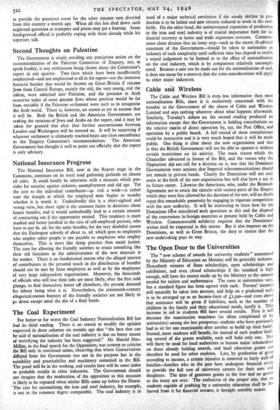Cable and Wireless
The Cable and Wireless Bill is even less informative than most nationalisation Bills, since it is exclusively concerned with the transfer to the Government of the shares of Cable and Wireless Limited and says nothing whatever about what happens afterwards. Similarly, Tuesday's debate on the second reading produced no information except that the Government is holding consultations on the relative Merits of direct operation by, say, the Post Office, and operation by a public board. A full record of these consultations could be instructive and it is very much hoped that it will be made public. One thing is clear about the new organisation and that is that the British Government will not be able to operate it without certain restrictions on its activity. The main reason which the Chancellor advanced in favour of the Bill, and the reason why the Opposition did not call for a division on it, was that the Dominion Governments were anxious that Imperial telecommunications should not remain in private hands. Clearly the Dominions will not only assist at the birth of the new organisation but will also have a say in its future career. Likewise the Americans, who, under the Bennud2 Agreement are to retain the circuits with various parts of the Empire which they were first allowed for the duration of the war, will no doubt repay this remarkable generosity by engaging in vigorous competition with the new authority. It will be interesting to learn how far the Dominions htve considered such questions as this and the disposal of the concessions in foreign countries at present held by Cable and Wireless. Commonwealth solidarity requires that the Dominions' wishes shall be respected in this matter. But it also imposes on the Dominions, as well as Great Britain, the duty to ensure that the new undertaking pays its way.


























 Previous page
Previous page